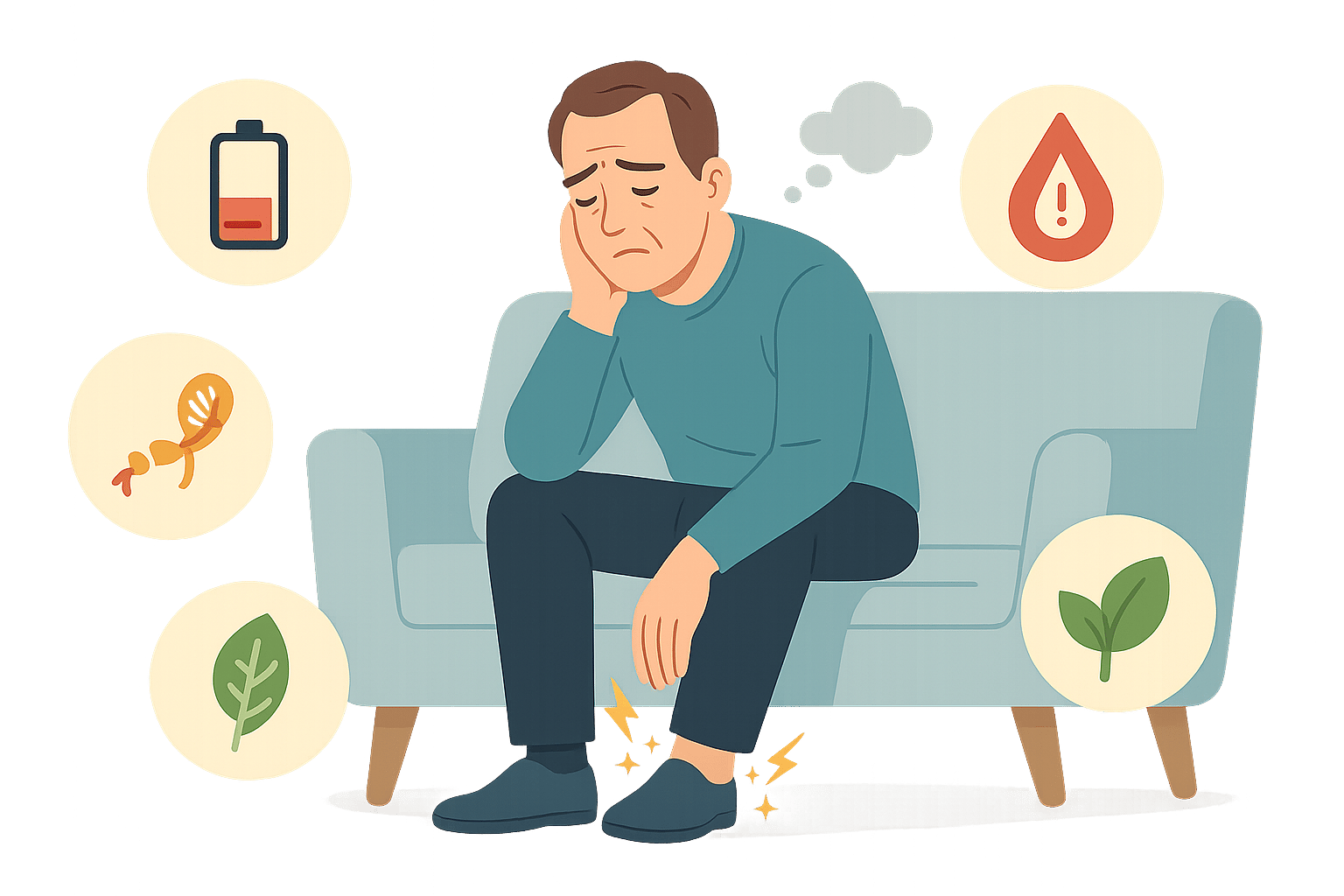- Vitality Insights
- Posts
- B12: Why Low Levels Can be Dangerous
B12: Why Low Levels Can be Dangerous
Tired, tingling, foggy? It might be B12.

Why I wrote this Article
You know, sometimes life surprises you in the most unexpected ways. My wife and I were at a local health and wellness event not too long ago, just enjoying the day and chatting with folks. Out of the blue, she mentioned that her fingers felt a bit numb, and there was this odd tingling that crept into her hand and even a little twitch on her face. It was a bit startling at first, and that moment really set us on a path to understanding just how crucial vitamin B12 is—and how easily low levels can sneak up on you.
Dangers of Low B12 – At a Glance
Nerve Damage: Tingling, numbness, balance issues, and even permanent neurological impairment.
Cognitive Decline: Memory loss, confusion, mood changes, and dementia-like symptoms.
Anemia: Fatigue, pale skin, breathlessness, and heart palpitations due to megaloblastic anemia.
Mental Health Issues: Depression, anxiety, paranoia, or hallucinations—even without anemia.
Pregnancy Risks: Birth defects, developmental delays, and low birth weight.
Irreversible Harm: Untreated B12 deficiency can lead to permanent nerve and brain damage.Office of Dietary Supplements
What is vitamin B12?
Vitamin B12 is an important nutrient that helps your body keep your nerve cells and blood cells healthy. It also helps your body make DNA, the genetic material in all of your cells. Your body doesn't make vitamin B12 on its own. You have to consume food and drinks that have vitamin B12 in order to get it. Vitamin B12 is found in animal products you eat and drink, like meat, dairy and eggs. It can also be found in fortified foods (foods that have certain vitamins and nutrients added to them) such as certain cereals, bread and nutritional yeast.
Adults need around 2.4 micrograms (mcg) of vitamin B12 a day, and women who are pregnant or breastfeeding need more. The amount of vitamin B12 babies and children need varies based on age.
What is vitamin B12 deficiency?
Vitamin B12 deficiency happens when your body is either not getting enough or not absorbing enough vitamin B12 from the food that you eat that it needs to function properly. Vitamin B12 is needed to make red blood cells. Because of this, a lack of vitamin B12 can cause anemia. People can have a vitamin B12 deficiency without having anemia.
Untreated, vitamin B12 deficiency can cause physical, neurological and psychological problems.
How common is vitamin B12 deficiency?
Any person can develop vitamin B12 deficiency at any age. People who are 60 years old or older are more likely to have vitamin B12 deficiency compared to other age groups.
Approximately 1.5% to 15% of people have vitamin B12 deficiency. Here are the percentages of people who have vitamin B12 deficiency based on age ranges:
At least 3% of people aged 20 to 39 years old.
At least 4% of people aged 40 to 59 years old.
At least 6% of people who are 60 years or over.
How to confirm it (tests that matter)
CBC + serum B12 as a start.
If B12 is borderline/low-normal (≈150–399 pg/mL) or the story strongly suggests deficiency, check methylmalonic acid (MMA) (most sensitive) ± homocysteine.
If the cause isn’t obvious, consider anti–intrinsic factor antibodies (autoimmune gastritis/pernicious anemia) and, if negative but suspicion remains, serum gastrin. Office of Dietary Suppl
Medications & B12 you should know about
Metformin: long-term use can lower B12; major diabetes guidelines say to consider periodic B12 testing. Diabetes Journals+1
PPIs/H2 blockers: can reduce absorption from food and raise deficiency risk over time. Office of Dietary Supplements
Food & prevention basics (for diet-related risk)
Natural sources are animal foods (meat, fish, eggs, dairy). Plant foods don’t naturally contain B12—use fortified foods or a supplement if you avoid animal products.
Adult RDA is 2.4 mcg/day (2.6 pregnancy, 2.8 lactation). There’s no upper limit for B12; it’s generally safe even at high doses. B12 doesn’t boost energy in non-deficient people. Office of Dietary Supplements
I hope our story gives you a reason to pay a bit more attention to those subtle signs your body might be sending. Use this information wisely, and remember that sometimes a little awareness can make a big difference in your overall well-being. After all, it’s those everyday moments, even at a simple vendor fair, that can lead us to take better care of our health and live life a little more vibrantly.
If the conversation sparked something in you — a new idea, a moment of calm, or a little boost — I’d be honored if you shared it with someone you care about.
Daniel Fee 559-701-8088
Reply